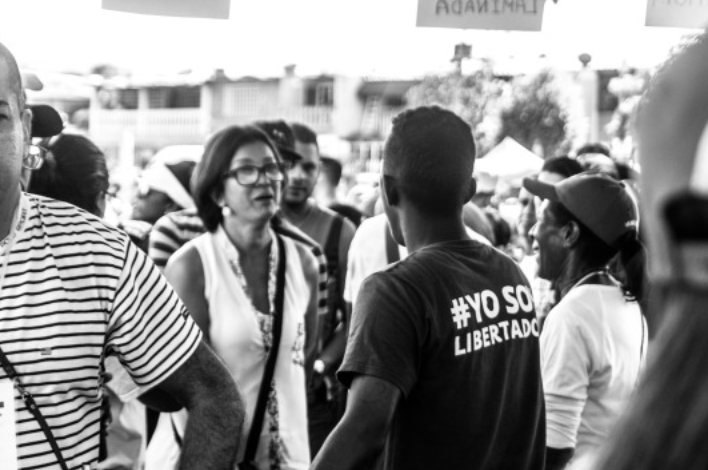The dust has not yet settled from yesterday’s plebiscite and the interpretive terrain is still moving. Here are some of my takeaways.
The Good
- The event was a good strategic move for the opposition, which needed to move beyond the continuous street protests of the past three and half months, to and activity that could aggregate discontent in a different way.
- The government deserves some credit for moving beyond suggestions that this plebiscite was unconstitutional and illegal, to implicit recognition that it was legal, if non-binding and partisan. Nicolás Maduro even called for both events to be held in peace.
- For a self-made plebiscite not using state resources, this was a herculean task that was largely successful (although see below).
- Kudos to the people. This was no normal electoral event. It was clear that those participating were there to vote against the ANC meaning to be seen going to vote is to be seen as a government opponent. That is a not ureasonable cause for fear, especially in many popular barrios where colectivos are present. However, many citizens confronted this fear and went anyway (See here and here).
The Bad
- The opposition mismanaged expectations and did not fully aggregate existing discontent. Some officials said they expected 14 million people to turnout, at the same time that they only printed up 8 million ballots and only marshalled roughly a fifth of the electoral tables normally used in a national election. Add to this highly tendentious questions that were designed to mobilize their base but not reach out to disaffected Chavistas, and the result was not as big as it could have been. As Luis Vicente Leon suggested, what should be a great victory is now being cast as a disappointment by some.
- One can add to mismanaged expectations National Assembly president Julio Borges incorrect statement that they had achieved more votes than Nicolas Maduro had in 2013. This both misled the public, unnecessarily harms MUD credibility, and suggested that this was the goal they were aiming for. Knowing they came up short, he should have focused on the imagery of massive turnout.
- The opposition came up just short of three important thresholds: the number of people who voted for Maduro in the April 2013 Presidential election (which would have been the number needed to revoke Maduro had the recall referendum not been postponed), the number of people who voted for Capriles in the 2013 election, and the number who voted for opposition candidates in the December 2015 legislative elections. Were they really only able to put together 2000 electoral centers, or did they want to make sure that the images coming out would show lines and traffic jams? If the later, they robbed Peter to pay Paul and Paul was more important. With 3000 electoral centers, 15 million ballots just in case, and non-tendentious questions, they probably could have increased this result by 30-40% even if they lost a few radicals along the way (because of the non-tendentious questions.)
- The government organized a trial run of the ANC vote on the same day. There were reports of “stationary lines” meaning people had to wait in line for hours because of delay tactics meant to show high participation. This move wasted people’s time and caused unnecessary tension in some places where the CNE electoral center was next to a “punto soberano.”
- The collective(s) in Catia who fired into the crowd of people exercising their democratic rights earn the award for the most disgusting act of the day. Images of middle-aged women from the same popular sectors these collectives hail from, laying on the ground in puddles of blood will hopefully give pause to many who support or admire these collectives. The fatal victim was a much loved local nurse who went out of her way to attend to “malandros,” young men involved in crime and violence.
- Award for the worst soundbite of the day goes to Rector of the Universidad Central de Venezuela. To a logical question of what they, the “guarantors” of the event made of reports that one person had voted seventeen times, she said that that it would be impossible for someone who participated in this event to do such a thing. This response can only be taken as a sign that there were not controls against double voting or other abuses. If there were, she would have mentioned them clearly to dispel reasonable doubts.
The Potentially Worse
- The entire event has had an implicit bait-and-switch running through it which could lead the MUD to significant misteps. People who turned out to vote against the ANC, found themselves asked to vote for the Armed Forces to support the National Assembly (Question 2), and the third question starts with a logical call for the Constitutional validation of authorities but then adds the ambiguous figure of a “National Unity government” to “restore the Constitution. If the opposition tries to put forward a parallel government and seek international recognition, it could considerably complicate matters. Recognizing such a parallel government would be no small step for governments in the region and would likely take longer than the two week window they have before the ANC is installed. So far it looks like the opposition is not going this route. But you can assume it is still on the agenda of opposition radicals.
- It looks as though the government will focus on trying to dismiss and discredit the results of the plebiscite, with videos of people voting multiple times and spurious comparisons to other electoral processes—criticisms the opposition admittedly set itself up for. It would be much better if they listened to the population and changed course.



